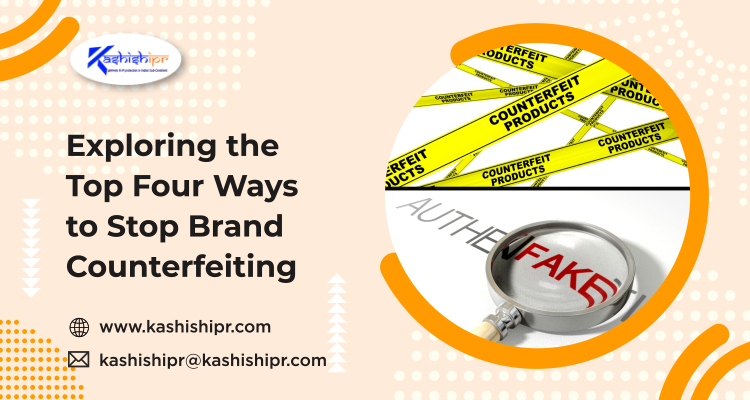Exploring the Top Four Ways to Stop Brand Counterfeiting
 Posted On
Posted On
Counterfeiting is an issue prevalent worldwide and affects everyone involved in a business. It is not unusual to encounter counterfeit versions of widely recognized brands like Adidas, Gucci, Nike, etc. Such products are fake and portrayed as popular brands to charge less than the market price and make enormous profits. Their corresponding ads trick innocent customers into believing that they are getting a real deal when, in fact, they are not.
In the United States, the overall trade value of counterfeit products is expected to reach $991 billion by the end of this year. When we talk about India, the nation has lost around one trillion rupees to counterfeiting, specifically during the COVID-19 pandemic.
There are undoubtedly many ways in which counterfeiting harms a business; some of those are as follows:
- Counterfeit products reduce the profits for legitimate business companies.
- They usually have a devastating effect on the brand’s reputation and customer loyalty.
- The faith and trust established between a brand and its customers are broken.
- Instead of putting money into R&D, business companies are forced to allocate resources towards combating the fakes.
However, it is certainly not impossible to stop brand counterfeiting, especially with the advancement in technology and law. So, let us now make ourselves familiar with the top four ways to stop brand counterfeiting.
- Protection of Essential Intellectual Property Rights
Before enforcing rights in Intellectual Property (IP), it is imperative to safeguard the different aspects of a product or service. For instance, a trademark safeguards the brand name, slogan, logo, tagline, etc., associated with a product. Copyright safeguards the original works of authorship, including artistic, musical, dramatic, and literary works, such as novels, computer software, poetry, movies, architecture, songs, etc. Patents safeguard novel inventions and innovations.
A strong and robust IP portfolio should be created through appropriate IP registrations as they act as primary evidence in any litigation or enforcement proceedings. Since it is possible to claim the priority date, counterfeits do not stand a chance against such brands. Even the brands take a step forward and educate their customers on Intellectual Property Rights (IPRs).
In the lawsuit filed by Hero Honda, their logo was wrongly used by another service provider in the same field, which caused them a massive loss. Due to the said Trademark Infringement, they got five lac rupees as damages.
- Criminal & Civil Enforcement of Infringement
Considering that IPRs are infringed or violated to a great extent, brands can take legal action and initiate proceedings against counterfeit products. Civil remedies are available for all forms of IP protection, and criminal remedies are available only for trademark and copyright infringements.
In civil litigation proceedings, the courts pass an injunction order against the counterfeits and direct the counterfeiters to pay damages, including a rendition of accounts to analyze the revenue gained through the illegal and unauthorized sale and marketing of counterfeit products. For instance, software piracy is common nowadays, specifically buying pirated versions of Microsoft Office at much lower rates. In this scenario, Microsoft initiated a civil case against the counterfeiters and was awarded compensatory damages and a permanent injunction.
In criminal proceedings, IP infringement is a cognizable offense where police officials have the power and authority to search, seize, and arrest on a court warrant or order. The court may punish the offender with a fine, imprisonment, or both. In a recent lawsuit filed in the United States, four offenders were arrested based on allegedly importing goods from China and then imprinting trademarks of well-known brands like UGG boots, Timberland boots, Nike Air Jordans, and Beats headphones. The value of all the counterfeited goods in question was more than $130 million.
- Using Technology to Protect the Brand
There is an increase in counterfeit products, with the advancement of technology, on the one hand, and new technologies are being used to curb the menace on the other hand. One of the most crucial technologies used is tracking and tracing the products and providing end-to-end protection in the supply chain. Such methods may incorporate serialization of products or place a QR code for scanning or imprinting digital watermarks to prove the holder’s identity, use nanotechnology to put invisible images on the products, put barcodes and RFID codes for tracking and tracing systems, implement artificial intelligence and connect the same to smartphones, etc. Kindly note that enforcing advanced technologies shall help maintain the trust and loyalty of the customers in the products, as they shall own the liberty to verify the identity of the products.
The luxury brand, LVMH, has implemented a blockchain technology system where the customers can conveniently scan the label and get information about the desired product. Moreover, it shows info on whether the product is original or fake.
The Indian Government is also passing rules and regulations concerning the protection of brands. An official order stating that QR codes should be there on the labels of all pharmaceutical products to track and trace them has been passed and shall be in force from January 2023.
- Creating Awareness of Counterfeit Products
Creating awareness of counterfeit products among the employees of brands and customers is exceedingly vital. Brands may choose to establish guidelines on how to communicate their IPRs to the ideal customers and make them aware of the counterfeits in the market. They can also get in touch with a legal counsel to strategize their brand protection schemes. Working with an IP associate and an efficient legal team shall always come in handy to the brands.
If you wish to safeguard your brand against counterfeit products, you may contact us at kashishipr@kashishipr.com and further share your requirements or discuss your queries.
The IP experts at Kashishipr work efficiently towards brand protection and create awareness of counterfeit products. They also provide necessary services, strategies, and methods to brand owners to safeguard their brand image and reputation. ✅ For more visit: https://www.kashishipr.com/
